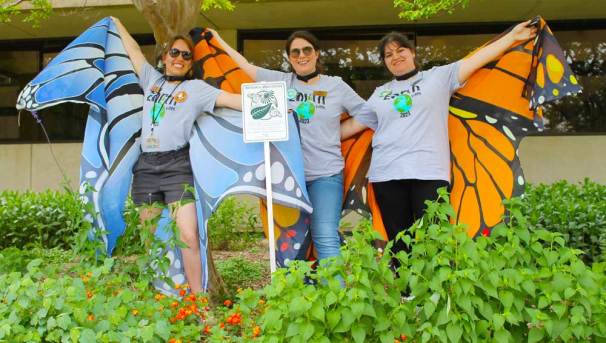Celebrate Earthweek at UTD and help unlock $250 to support UTD Sustainability
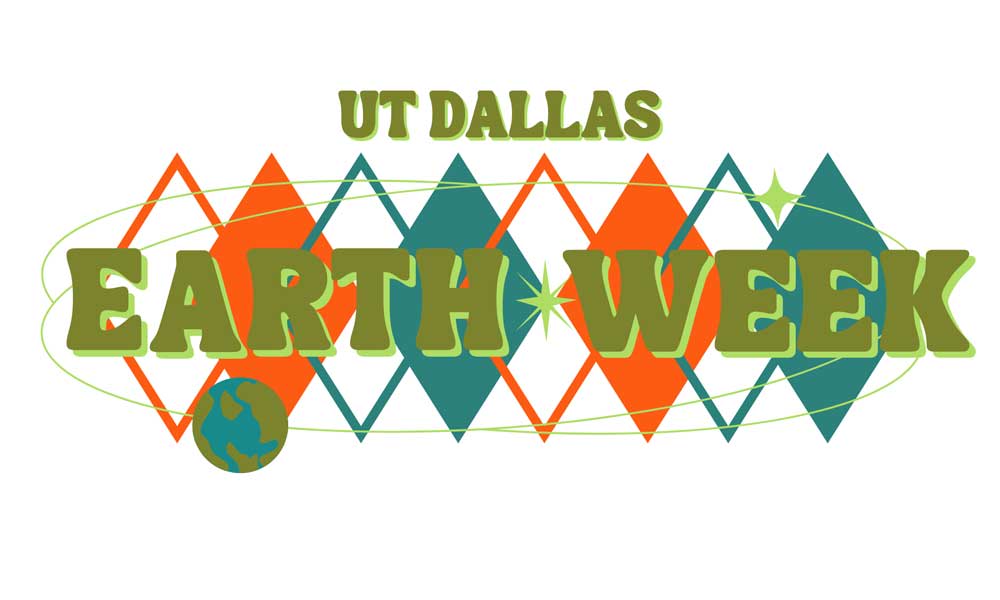
UTD is celebrating its 13th annual Earth Week! Hosted by the Office of Sustainability and the Office of Student Volunteerism, Earthweek continues the legacy of Earth Day, which was started in 1970 to recognize when millions of Americans gathered at universities and cities to start the modern environmental movement. Since then, it has been used worldwide to safeguard our planet and fight for a brighter future. This year’s theme is “Green UTD,” highlighting sustainability efforts on campus and how you can get involved!
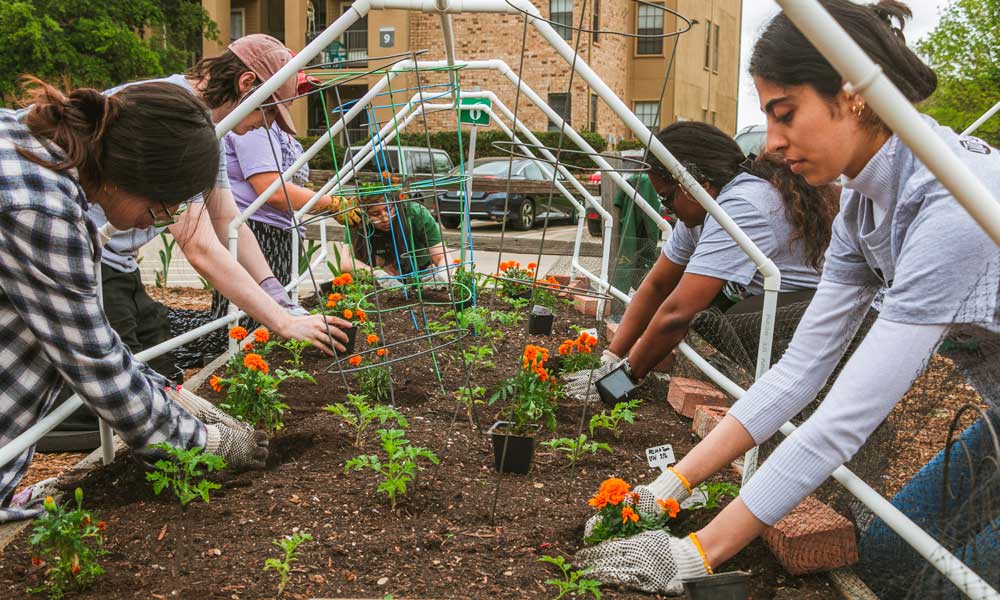 To celebrate Earthweek, an anonymous donor is challenging 50 Comets to make a donation to support the Office of Sustainability. Your donation will help support the EcoHub, Bee Campus USA and other sustainability initiatives. For every 10 donors who make a donation, the donor will donate $50, up to $250 total. Make your donation today to help unlock additional support for green initiatives at UTD!
To celebrate Earthweek, an anonymous donor is challenging 50 Comets to make a donation to support the Office of Sustainability. Your donation will help support the EcoHub, Bee Campus USA and other sustainability initiatives. For every 10 donors who make a donation, the donor will donate $50, up to $250 total. Make your donation today to help unlock additional support for green initiatives at UTD!
Earthweek also includes many great events like Earth Day Butterfly Flutterby , Sustainable Garden Crafts, Earth Fair, Bee Movie Screening at The Meteor Theater, Highway Clean Up and Eco Hub Workday. You can find a list of all Earthweek events at https://sustainability.utdallas.edu/campus/earthweek/
More about EcoHub
 In fall 2021, The Office of Sustainability launched its brand-new UTD Eco Hub, which is a hive for student leadership for sustainability on campus and in our community.The facility features about 20,000 square feet of high-quality soil, built with the compost that was on site from the compost operations at the location, and an apiary where students can participate in the care for the honeybees while learning from UTD’s experts, Dr. Scott Rippel and Dr. Christina Thompson.
In fall 2021, The Office of Sustainability launched its brand-new UTD Eco Hub, which is a hive for student leadership for sustainability on campus and in our community.The facility features about 20,000 square feet of high-quality soil, built with the compost that was on site from the compost operations at the location, and an apiary where students can participate in the care for the honeybees while learning from UTD’s experts, Dr. Scott Rippel and Dr. Christina Thompson.
The farm is guided by principles of organic farming, including the avoidance of harsh pesticides and herbicides. We grow produce in twelve sections, each dedicated to a different seasonal plant family. Before a new growing season, the plant families are assigned to a new plot in a process called “crop rotation,” which ensures that the soil microbiome maintains its diversity and reduces the depletion of any one macronutrient over time. The Eco Hub also practices a technique called “cover cropping,” which is the practice of growing crops that are typically not intended for eating, usually for the purpose of improving soil health. Cover crops serve a variety of different purposes like increasing nutrients, boosting organic matter, killing weeds, and breaking compaction. In fall 2022, we experimented with four different kinds of cover crops to increase nitrogen in the soil and to reduce soil compaction: daikon radish, winter rye, hairy vetch, and Austrian winter peas. We will use the results of soil tests taken before and after cover cropping to determine which cover crops are best suited for our needs. Crop rotation and cover cropping are part of a regenerative agriculture approach, which encourages farmers to work with the land to solve agricultural issues. The UTD Eco Hub is intended to be student led, with the primary focus of the microfarm being food production for food insecure communities through the Comet Cupboard and other North Texas Food Bank Partner Agencies. We also expect that the Eco Hub will become an area for students interested in sustainability issues to convene, provide service, build community, and provide education and outreach to peers.The Eco Hub is proud to be a registered North Texas Food Bank Partner Garden, USDA People’s Garden, and an American Heart Association Teaching Garden.
The UTD Eco Hub is intended to be student led, with the primary focus of the microfarm being food production for food insecure communities through the Comet Cupboard and other North Texas Food Bank Partner Agencies. We also expect that the Eco Hub will become an area for students interested in sustainability issues to convene, provide service, build community, and provide education and outreach to peers.The Eco Hub is proud to be a registered North Texas Food Bank Partner Garden, USDA People’s Garden, and an American Heart Association Teaching Garden.
More about Bee Campus USA and Honey Helpers
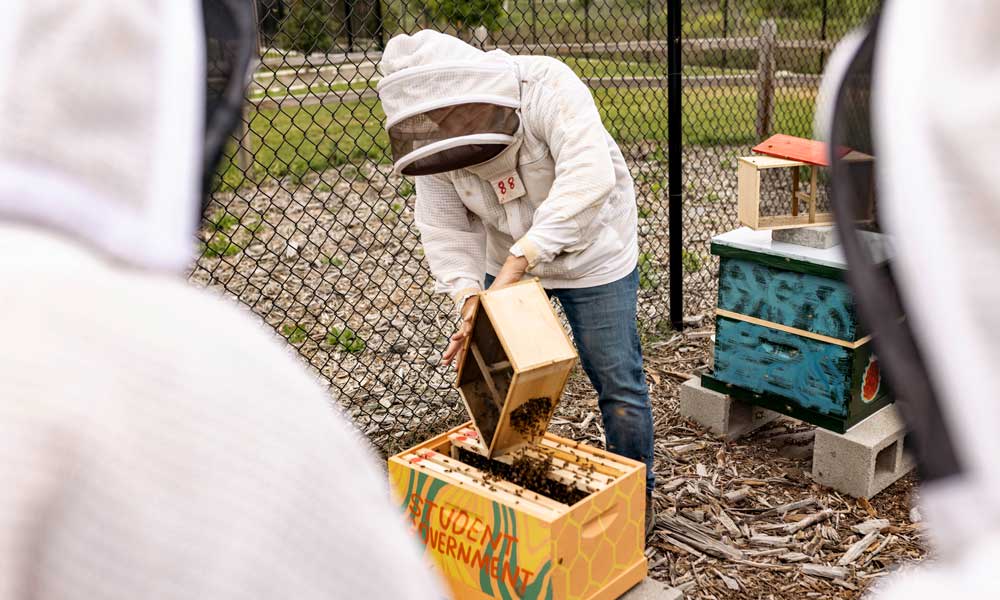 UTD is a an affiliate of Bee Campus USA, an organization that provides a framework for campus communities to work together to conserve native pollinators. Campuses are recognized for increasing the abundance of native plants, providing nest sites, and reducing the use of pesticides among other projects. UTD students, faculty, administrators, and staff work together to carry out these commitments and make our campus a better place for pollinators.
UTD is a an affiliate of Bee Campus USA, an organization that provides a framework for campus communities to work together to conserve native pollinators. Campuses are recognized for increasing the abundance of native plants, providing nest sites, and reducing the use of pesticides among other projects. UTD students, faculty, administrators, and staff work together to carry out these commitments and make our campus a better place for pollinators.
As a university we are committed not only to sustainable landscape management practices but to the education of our campus community. Our campus serves as an example and as inspiration for others seeking to beautify their landscapes while protecting pollinators. Through the use of native plants and trees, we have created an environment in which pollinators and students alike can thrive. Campus pollinator events engage students outside of the classroom and encourage them to step up as leaders of sustainability.
 It is estimated that pollinators, especially honey bees, are responsible for one out of every three bites of food we take and that they increase our nation’s agricultural values by more than $15 billion each year. Research has established that honey bees have been in serious decline for more than three decades in the United States. Throughout each semester, the Office of Sustainability hosts events in which students, from all majors, can enter our apiaries and learn about these pollinators in ways they will never forget. These experiences allow students to see bees in managed and wild habitats so that they may learn about the behaviors of bees and the threats that face colonies today.
It is estimated that pollinators, especially honey bees, are responsible for one out of every three bites of food we take and that they increase our nation’s agricultural values by more than $15 billion each year. Research has established that honey bees have been in serious decline for more than three decades in the United States. Throughout each semester, the Office of Sustainability hosts events in which students, from all majors, can enter our apiaries and learn about these pollinators in ways they will never forget. These experiences allow students to see bees in managed and wild habitats so that they may learn about the behaviors of bees and the threats that face colonies today.
Participants join Dr. Rippel and our Bee Campus USA Eco Rep in collecting frames of honey during select times of each season. Students put on protective equipment, open the hives, and pull out honey frames. These frames are transported to the lab for processing. Here students scrape the frames, filter out the wax, and bottle the clarified honey for our Comet Honey sale. These events allow students to glimpse at the daily workings of bees and beekeepers. Both the economic and ecological benefits bees provide to our society are witnessed by students in a hands-on setting.
To ensure the health of our bees, hives are inspected regularly throughout each semester. During inspection events, students learn to examine bee behavior for signs of disease, swarming, and environmental concerns. Students remove hive frames containing larvae to gauge the queen’s laying pattern and overall health of the hive.
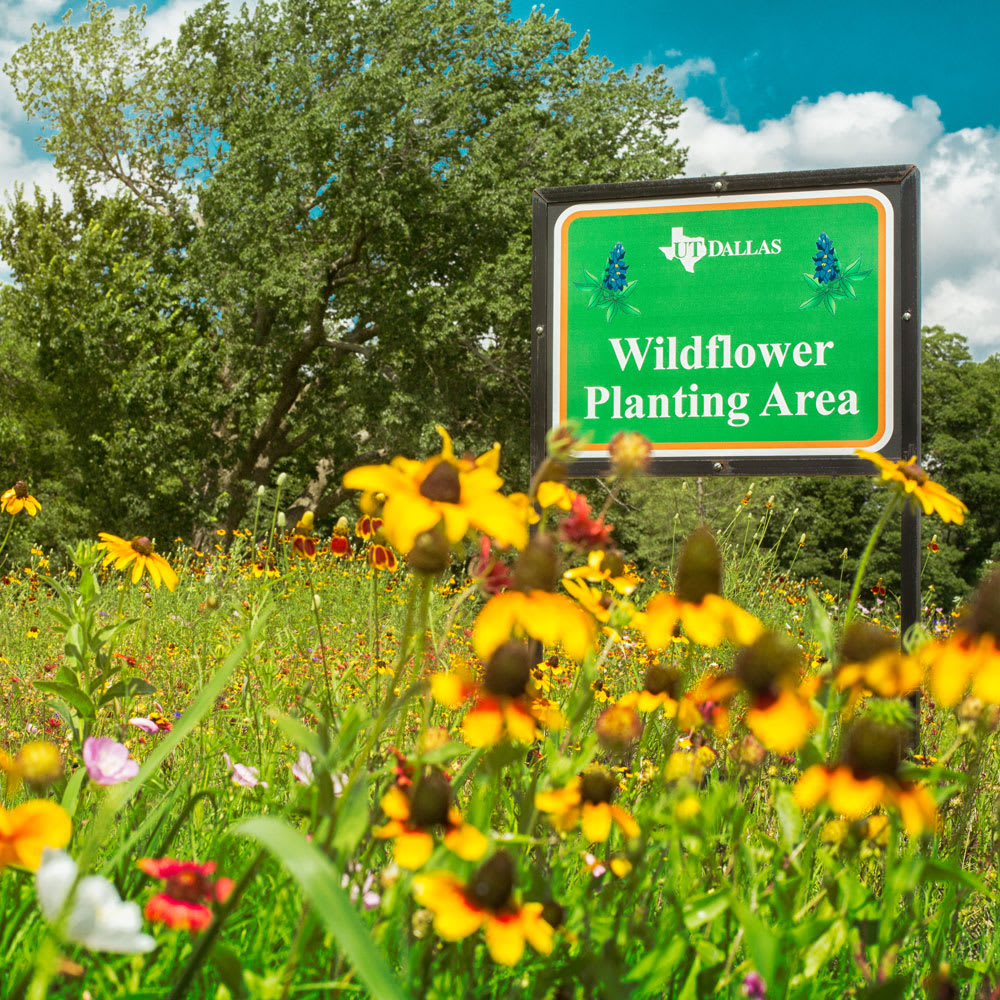 The Office of Sustainability also sells honey (called “Comet Honey”) collected by Honey Helpers one to two times a year for $5 per bottle. The timing and frequency of sales depends on the honey production of the bees and the availability of volunteers to collect and process honey. We are typically not able to commit to large pre-orders of honey (10 or more bottles) due to this uncertainty. To be notified when the next sale will be taking place, please subscribe to our newsletter and follow our Instagram.
The Office of Sustainability also sells honey (called “Comet Honey”) collected by Honey Helpers one to two times a year for $5 per bottle. The timing and frequency of sales depends on the honey production of the bees and the availability of volunteers to collect and process honey. We are typically not able to commit to large pre-orders of honey (10 or more bottles) due to this uncertainty. To be notified when the next sale will be taking place, please subscribe to our newsletter and follow our Instagram.
More about the Office of Sustainability
The Office of Sustainability was established under Facilities Management in 2011. We define sustainability as “meeting the needs of the present without compromising the ability of future generations to meet their own needs.”
The Office of Sustainability utilizes United Nations Sustainable Development Goals (SDGs) to connect students’ education to transdisciplinary application in order to create a more sustainable world.
UT Dallas is a member of the Association for the Advancement of Sustainability in Higher Education (AASHE) and measures holistic effectiveness according to AASHE’s Sustainability Tracking, Assessment, & Rating System (STARS) Report which encompasses administration, academics, engagement, and operations.
We believe that sustainability is a collaborative field to which all members of the UT Dallas community contribute. The Office of Sustainability collaborates with stakeholders and students across The University to facilitate the integration of sustainability principles and practices into all areas of The University of Texas at Dallas.
If you have any questions about sustainability at The University of Texas at Dallas, or would like to collaborate for a project or event, please contact us.

